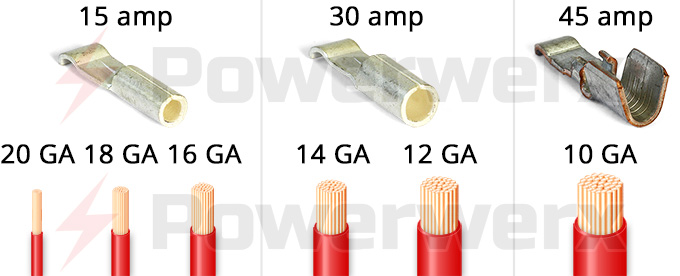So, I guess you could use ga wire with a amp breaker if it was only used for a welder with or less duty cycle. Is it ever safe to have gauge wire anywhere on. What kind of wire would i need to carry.
What size wire do I need to connect a portable. For a 20- amp circuit, use 12- gauge wire. For a 15- amp circuit, you can use 14- gauge wire (in most locales). For a long run, though, you should use the next larger size wire. Below are examples of typical circuit breakers.
The one on the left is an example of a 1volt amp breaker. A - amp breaker does not operate safely with a 12- gauge wire. The minimum wire size that is allowable for use with a - amp breaker is gauge. A smaller gauge of wire indicates a larger diameter and the ability to carry more current safely.
The length of wire -run should also be factored-in when deciding the correct wire size. Although 15- amp circuits were once quite common, 20- amp circuits wired with 12. Note: It just calculates the voltage drop, consult the above table for rules-of-thumb, or your local or national electrical code or your electrician to decide what is legal! Wire Gauge Design Procedure. Oversized breaker size is a problem.
However, you WILL pop the breaker on a regular basis, you WILL void the warranty for the stove. If you leave it this way, it will work. Americord your Power Cord Specialist.
Always oversize wires if voltage drop is critical. The larger the wire , the smaller the gauge number. To find the required wire gauge for a specific application, you must know the current draw of the accessory on the circuit and the total wire length between the accessory and the power source. I would have expected it to say that gauge copper wire was the smallest acceptable wire to use. Both will be on their own 220V 20A breakers.
They will be located about wire feet (one way) from the sub panel. With types TW and UF, gauge is rated for amps. Check the type (printed on the insulation) to see what you have. Increase the wire size for runs in excess of 1feet, or for applications where heat cannot be easily dissipate such as for cords housed in a conduit.

Three pumps of a pump station ( , 1 and ½ horsepower) are connected to the power source of 460-volts, 3-phase. Yellow 12-3- Gauge Type NM-B Cable. SlikQuik jacket allows for reduction in pulling force for easier installation. The wire size calculator will give you a very simple and quick solution to the problem of calculating the size of wires and cables for pump applications in golf courses, landscape projects, and agriculture.
What gauge wire for amp – detailed formula. In order to determine the appropriate wire gauge , first you have to figure out the current draw (in amperes) of your amplifier (or amplifiers). Assuming a 120VAC circuit and to maintain a maximum percent voltage drop from load to panel, upsizing to 4AWG.

Below ia a quick guide of what size wire to use for the size of the current draw of the device. Important: This is a general guide, never exceed of the amphere rating. For Example: If the circuit is likely to draw amps , you will need to install a amp circuit. Brandon, The inline fuse on the power cable near the battery is there to protect you and your vehicle from a fire in the event of a short circuit.
The size of the fuse depends only on the size of the power wire. Each copper wire core is composed of smaller gauge strands of pure copper creating high conductivity, flexibility, and durability. Common US AWG wire gauges and amps ratings. Ideal for wiring volt or volt electrical systems with a maximum voltage rating of volts.
Household wiring for 120-V circuits is almost always 12- or 14- gauge copper wire. I am planning on putting an inline 30amp fuse. I have a room that someone used gauge wire to all of the wall plugs. The wiring is all gauge from the breaker panel to this one room.
Would this be safe if I installed a amp breaker and left the run as is? Room is sheet rocked so would be tough to switch out to gauge wire. How to use the amp wiring gauge chart: Select the column for the length of wire you need at the bottom of the chart.
Then select the row with the number of amps (current) that your amplifier will use at max power.
No comments:
Post a Comment
Note: Only a member of this blog may post a comment.